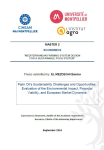El Mezdeghi B. (2024).
Palm oil’s sustainability challenges and opportunities: evaluation of the environmental impact, financial viability, and European market dynamics. Mémoire (Master 2 MIDAS) : CIHEAM-IAMM, Montpellier (France). 69 p. Master 2 Thesis. Economics. Programme: Mediterranean farming system design for a sustainable food-system [MIDAS]. Co-accreditation University of Montpellier, Institut Agro Montpellier, CIHEAM-IAMM.
| Titre : | Palm oil’s sustainability challenges and opportunities: evaluation of the environmental impact, financial viability, and European market dynamics |
| Auteurs : | B. El Mezdeghi |
| Type de document : | Thèse, Mémoire, Master |
| Année de publication : | 2024 |
| Format : | 69 p. |
| Note générale : | Master 2 Thesis. Economics. Programme: Mediterranean farming system design for a sustainable food-system [MIDAS]. Co-accreditation University of Montpellier, Institut Agro Montpellier, CIHEAM-IAMM. |
| Langues : | Anglais |
| Langues du résumé : | Anglais ; Français |
| Catégories : |
Catégories principales 10 - INDUSTRIES ; 10.2 - IAA (en général)Thésaurus IAMM HUILE DE PALME ; EVALUATION IMPACT SUR ENVIRONNEMENT ; DURABILITE ; LABEL DE QUALITE ; EUROPE |
| Résumé : | Palm oil has always been a subject of debate due to its negative impact on the environment. The European Union countries, one of the biggest consumers of palm oil, are indirectly linked to the level of environmental degradation due to its level of demand that leads to more production, more land conversion and monoculture. Palm oil became one of the seven commodities addressed by European Union Deforestation Regulation (EUDR), to be applied by the end of 2024 and would prohibit importing products from deforested areas. Sustainability certifications like the Roundtable of Sustainable Palm oil (RSPO) established in 2004, were introduced to the palm oil industry as a response to the adverse environmental impacts associated with the development of oil palm. This study aims to evaluate the environmental impact of RSPO certified palm oil as a recommended alternative in comparison to non-certified palm oil using Simapro for life cycle impact assessment. As the results showed that RSPO certified palm oil is less impactful according to the PEF (product environmental footprint) methodology, we then thrive to examine its financial viability and justify through bibliography, reasons for investing in certified sustainable palm oil, and outlines the succeeding actions required in the market for certified sourcing. Additionally, the study reviews and assesses the current actions taken by the European companies for palm oil sourcing decisions. All of that to raise awareness among actors involved in the palm oil industry, the benefits and responsibilities associated with sustainable sourcing. The document will also include potential recommendations for better actions and more responsible sourcing decisions |
| Nature du diplôme : | Mémoire (Master 2 MIDAS) |
| Université de soutenance : | CIHEAM-IAMM |
| Ville de l'université de soutenance : | Montpellier (France) |
| Cote : | Réservé lecteur CIHEAM |
| Directeur de Thèse : | Bourceret A. |
| Membres du Jury : | Belhouchette H.; Kleftodimos G.; Ascensio E.; Bourceret A. |







